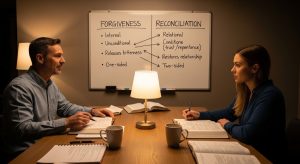Forgiving yourself is one of the hardest parts of healing, and learning how to forgive yourself for past mistakes is a crucial journey. Many people can offer grace to others, but they struggle to show that same kindness to themselves. Feelings of guilt, regret, shame, or “I should have known better” can stay with us for years. Doug Thiel, a spiritual writer and teacher, understands this deeply. Through his writings and experiences, he helps people walk through forgiveness using a blend of faith, emotional healing, and simple daily practices.
This guide brings together psychology, spiritual wisdom, and real-life encouragement to help you finally let go and step forward with peace. Whether your struggle comes from a painful decision, a broken relationship, or something you can’t stop replaying in your mind, you can heal. You can grow. And with God’s help, you can start again.
Why Forgiving Yourself Is So Hard
It’s normal to ask, “Why can’t I move on? ” Studies show that nearly 52 percent of adults struggle with self-forgiveness after a major mistake. From a psychological point of view, this happens because the brain tends to hold on to negative memories more strongly than positive ones. Shame also convinces us that we are the mistake, not that we simply made one.
Spiritually, many people carry guilt because they believe they must “earn” forgiveness. Doug Thiel often reminds his readers that self-forgiveness isn’t about pretending the past didn’t happen. It means choosing healing over punishment. It means accepting that God’s grace is bigger than our failures.
“Forgiveness is not saying the past was okay. It is choosing not to let the past control the rest of your life.” – Doug Thiel
The Real Cost of Holding On to Guilt
When you don’t forgive yourself, your mind stays trapped in a loop. Mentally, this can cause stress, depression, anxiety, sleeplessness, and low self-worth. Spiritually, it can leave you feeling distant from God or unworthy of His love.
Studies from the American Psychological Association show that people who forgive themselves experience:
- Lower stress levels
- Better emotional health
- More stable relationships
- Higher self-esteem
- Greater sense of spiritual peace
Forgiving yourself isn’t just emotional; it is physical and spiritual healing.
Step 1: Acknowledge What Happened Honestly
Forgiveness begins with honesty. Instead of avoiding the mistake, name it. Describe it. Allow yourself to feel the emotion attached to it. In psychology, this is called recognition and emotional labeling, which helps the brain process difficult experiences rather than hide from them.
You might say:
“Yes, I made a mistake. I am not proud of it. But I will face it instead of hiding from it.”
This simple step removes the power of shame. Doug Thiel teaches that honesty is the doorway to God’s grace. Once we stop hiding, we allow healing to begin.
Step 2: Understand Why You Made the Choice
Many people keep punishing themselves because they never explore the deeper reason behind the mistake. Psychology calls this root-cause reflection.
Ask yourself:
- What was I feeling at that time?
- What stress or fear influenced my choice?
- What did I not know then that I know now?
This isn’t an excuse; it’s understanding. Doug Thiel often reminds readers that God sees the heart behind every decision. You are not defined by the worst moment of your life. There were reasons, pressures, and limits you were facing at the time.
Step 3: Replace Harsh Self-Talk With Compassion
Your inner voice matters. Psychological research shows that self-compassion reduces shame and increases forgiveness. If you constantly tell yourself:
- “I’m terrible.”
- “I always mess things up.”
- “I don’t deserve forgiveness.”
Then your heart can never heal.
Doug Thiel encourages readers to speak to themselves the way God speaks to them with love, mercy, and truth. Try telling yourself:
“I am human. I can learn. I can grow. God still has good plans for me.”
Step 4: Make Things Right If You Can
Sometimes forgiving yourself becomes easier when you take a small step to repair what was damaged. This may include:
- Apologizing sincerely
- Returning something you took
- Restoring trust slowly
- Changing your behavior
Not every mistake can be fixed outwardly, but every mistake can lead to inner transformation. Doug Thiel emphasizes that forgiveness is not just about emotion; it is about action and growth.
Step 5: Accept God’s Forgiveness and Grace
Many people believe God forgives them, but they continue to hold themselves hostage. Scripture reminds us:
“If anyone is in Christ, he is a new creation.” (2 Corinthians 5:17)
You don’t become new by ignoring the past. You become new by receiving God’s grace and allowing it to change how you see yourself.
Doug Thiel’s writings highlight that forgiveness is a spiritual partnership. God offers grace. You choose to receive it. Together, you both rewrite your story.
Step 6: Create a Forgiveness Ritual
Rituals help the brain and the heart work together. Choose one of the following:
- Write a letter to yourself and say, “I release this.”
- Say a forgiveness prayer every morning.
- Breathe deeply and imagine letting go of the weight.
- Journal what you’ve learned from the mistake.
When you repeat these actions, your brain replaces old shame with new hope.
Step 7: Move Forward With Intentional Growth
Forgiveness is not the end; it is the beginning. Ask yourself:
- What did this experience teach me?
- How will I respond differently in the future?
- What habits can I build to avoid repeating the mistake?
Doug Thiel teaches that forgiveness opens the door to transformation. When you forgive yourself, you become wiser, softer, and more compassionate to others.
Faith, Psychology, and Personal Growth Working Together
When faith and emotional science work together, healing becomes complete. Psychology explains how the mind heals. Faith reveals how the soul heals. Inspiration gives you the courage to take the next step.
Forgiving yourself doesn’t erase the past, but it frees your future. You are not the same person who made that mistake. You are growing. You are learning. You are healing with God walking beside you and with teachers like Doug Thiel guiding you along the way.
Frequently Asked Questions
Most people struggle because shame convinces them they don’t deserve grace. But forgiveness is about healing, not earning.
No. Forgiveness means you no longer let the past control your life.
It’s different for everyone. Some heal in weeks, others in months or years. What matters is consistent progress.
Faith offers hope, meaning, and a sense of being loved unconditionally. Many people find healing faster when they lean on God.
You can still forgive yourself. Growth is not perfect. Keep learning and moving forward.
Final Encouragement
You were never meant to carry this burden forever. With faith, compassion, and the gentle guidance of teachers like Doug Thiel, you can release the past and step into the life God intended for you. Today is a new chapter, one written with forgiveness, peace, and hope.





